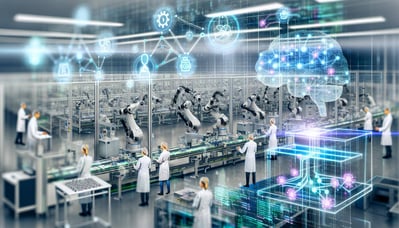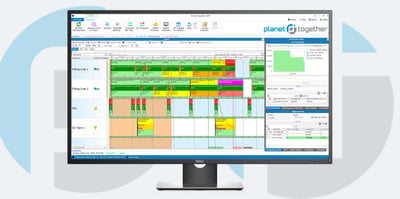Machine Learning for Global Production Optimization
The integration of cutting-edge technology is no longer just an option but a necessity in pharmaceutical manufacturing. As the industry evolves, embracing innovative solutions becomes imperative for staying competitive and ensuring the highest standards of quality and productivity.
One such innovation that holds immense promise for revolutionizing pharmaceutical manufacturing is machine learning (ML). By harnessing the power of ML algorithms, pharmaceutical companies can optimize their global production processes, driving efficiency, reducing costs, and ultimately enhancing patient outcomes.
In this blog, we look into the transformative potential of ML in manufacturing IT, with a focus on its integration with leading ERP, SCM, and MES systems like PlanetTogether and SAP, Oracle, Microsoft, Kinaxis, Aveva, and others.

Machine Learning in Manufacturing
At its core, ML involves the development of algorithms that enable computers to learn from data and make predictions or decisions without being explicitly programmed. This technology has garnered significant attention across various industries due to its ability to uncover valuable insights from large datasets and optimize complex processes.
In the context of manufacturing, ML can analyze historical production data, identify patterns, and predict outcomes, thus enabling companies to make data-driven decisions in real-time. This predictive capability is particularly valuable in pharmaceutical manufacturing, where precision and consistency are critical for ensuring product quality and regulatory compliance.

Integration with ERP, SCM, and MES Systems
To fully leverage the benefits of ML in pharmaceutical manufacturing, seamless integration with existing IT infrastructure is essential. ERP (Enterprise Resource Planning), SCM (Supply Chain Management), and MES (Manufacturing Execution Systems) are the backbone of manufacturing operations, facilitating the coordination of resources, materials, and processes across the entire value chain.
Leading ERP systems like SAP, Oracle, Microsoft Dynamics, and MES solutions like Aveva and Wonderware play a crucial role in managing manufacturing processes, tracking inventory, and ensuring compliance with regulatory requirements. Integrating ML capabilities into these systems enhances their functionality, enabling advanced analytics, predictive maintenance, and real-time optimization.
For instance, integrating ML algorithms with PlanetTogether, a leading production planning and scheduling software, can revolutionize production optimization in pharmaceutical manufacturing. By analyzing production data, demand forecasts, and resource constraints, ML models can dynamically adjust production schedules, optimize inventory levels, and minimize lead times, thereby enhancing operational efficiency and responsiveness to market demands.
Similarly, integration with ERP systems such as SAP and Oracle allows pharmaceutical companies to leverage ML for demand forecasting, predictive maintenance, and quality control. By analyzing historical sales data, market trends, and production parameters, ML models can generate accurate demand forecasts, optimize inventory management, and identify potential quality issues before they escalate, thus reducing waste and improving customer satisfaction.

Challenges and Considerations
While the potential benefits of integrating ML into manufacturing IT are significant, several challenges and considerations need to be addressed to ensure successful implementation:
Data Quality and Integration: High-quality data is essential for training ML models effectively. Pharmaceutical companies must ensure that data from disparate sources, including ERP, SCM, and MES systems, is standardized, cleaned, and integrated to facilitate accurate analysis and decision-making.
Regulatory Compliance: The pharmaceutical industry is highly regulated, with strict compliance requirements governing manufacturing processes and product quality. Companies must ensure that ML algorithms comply with regulatory standards, such as Good Manufacturing Practice (GMP) and 21 CFR Part 11, to maintain product safety and regulatory compliance.
Change Management: Implementing ML-driven solutions requires a cultural shift within organizations, with employees needing to adapt to new technologies and workflows. Effective change management strategies, including training programs and stakeholder engagement, are essential for driving adoption and maximizing the benefits of ML integration.
Scalability and Maintenance: As production volumes and complexity increase, scalability and maintenance become critical considerations. Pharmaceutical companies must invest in scalable ML infrastructure and robust maintenance processes to ensure continued performance and reliability over time.
Machine learning holds immense promise for transforming global production optimization in pharmaceutical manufacturing. By integrating ML capabilities with leading ERP, SCM, and MES systems such as PlanetTogether, SAP, Oracle, Microsoft Dynamics, Kinaxis, and Aveva, pharmaceutical companies can unlock new opportunities for enhancing efficiency, reducing costs, and improving product quality.
However, successful implementation requires careful planning, robust data management practices, and a commitment to regulatory compliance and continuous improvement. By embracing machine learning and leveraging its predictive capabilities, pharmaceutical manufacturers can stay ahead of the curve, driving innovation and delivering value to patients worldwide.
Are you ready to take your manufacturing operations to the next level? Contact us today to learn more about how PlanetTogether can help you achieve your goals and drive success in your industry.























LEAVE A COMMENT